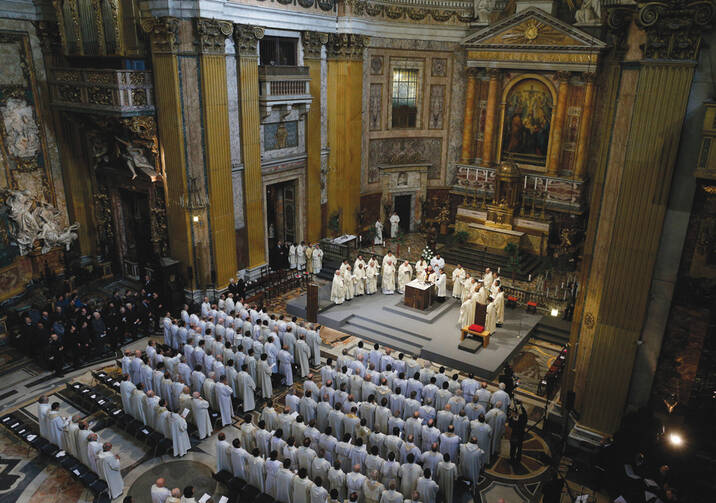The Gospel cannot be proclaimed “with inquisitorial beatings of condemnation. No, the Gospel is preached gently, with fraternity and love,” with an open heart “always longing” for God, like that of St. Peter Faber, Pope Francis told 350 fellow Jesuits at the Church of the Gesù in Rome. The pope had joined his order on Jan. 3 for a Mass to celebrate both the feast of the Most Holy Name of Jesus, the titular feast of the Society of Jesus, and the canonization of Peter Faber, a founding member of the Society of Jesus and the first of the Jesuits to be ordained a priest.
That was not the only guidance Pope Francis had to offer as the new year began. In an effort to discourage careerism, Pope Francis has abolished the conferral of the pontifical title of “Monsignor” on secular priests who are under the age of 65. Pope Francis also ordered a revision of what he called outdated Vatican norms on the relations between religious orders and local bishops in order to promote greater appreciation of the orders’ distinctive missions. That move was revealed on Jan. 3 in the Italian Jesuit magazine La Civiltà Cattolica, which published a detailed report on the pope’s closed-door meeting with 120 superiors generals of religious orders from around the world that took place on Nov. 29.
During that meeting, Pope Francis referred to “Mutuae Relationes,” a set of directives issued jointly by the Congregation for Bishops and the Congregation for Religious in 1978, which say that the “right to autonomy” of religious orders should never be considered as independence from the local church. “That document was useful at the time but is now outdated,” the pope said. “The charisms of the various institutes need to be respected and fostered because they are needed in dioceses.”
The pope, who until his election in March 2013 served as archbishop of Buenos Aires, Argentina, and formerly served as superior of the Jesuits’ Argentine Province, said he knew “by experience the problems that can arise between a bishop and religious communities.... The involvement of religious communities in dioceses is important,” the pope said. “Dialogue between the bishop and religious must be rescued so that, due to a lack of understanding of their charisms, bishops do not view religious simply as useful instruments.”
Noting the growth of religious orders in Africa and Asia, the pope acknowledged challenges to evangelization there, including correct adaptation of Catholic teaching to local cultures, as well as a temptation to exploit poorer societies as sources of vocations. Pope Francis said that sensitivity is needed not only when crossing geographical boundaries, but social and cultural frontiers as well.
“The situation in which we live now provides us with new challenges which sometimes are difficult for us to understand,” he said, noting that Catholic teachers must be prepared to “welcome children in an educational context, little boys and girls, young adults who live in complex situations, especially family ones.”
The pope added that seminary directors too must be sensitive to the needs of those in the formation process of religious orders, encouraging them to engage in sincere and fearless dialogue with their instructors. “Formation is a work of art, not a police action,” Pope Francis said. “We must form their hearts. Otherwise we are creating little monsters. And then these little monsters mold the People of God. This really gives me goose bumps.
“Just think of religious who have hearts that are as sour as vinegar: They are not made for the people,” the pope said. “In the end we must not form administrators, managers, but fathers, brothers, traveling companions.”








